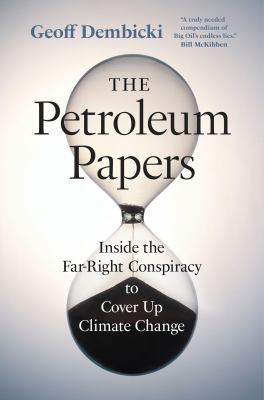Nibsy reviewed The Petroleum Papers by Geoff Dembicki
Well documented, but ended too soon
4 stars
This review was originally published on The Ink Smudge, March 1, 2023.
Journalist Geoff Dembicki's The Petroleum Papers: Inside the Far-Right Conspiracy to Cover Up Climate Change follows naturally from an earlier book by Naomi Oreskes and Erik Conway, Merchants of Doubt, which documents a complex campaign of disinformation to discredit science on matters of political importance, such as denying the negative health effects of smoking, the ecological impact of pesticides, and human-induced climate change. Oreskes and Conway showed that these propaganda campaigns are mostly based around a strategy developed by the tobacco industry in the 1950s, usually by a relatively small number of bad actors. It involves funding scientific research that produces industry-friendly results, grooming credentialed scientists to represent industry's interests in court, and challenging mainstream science in both traditional and, more recently, social media to give the public the illusion that the science is uncertain. This …
This review was originally published on The Ink Smudge, March 1, 2023.
Journalist Geoff Dembicki's The Petroleum Papers: Inside the Far-Right Conspiracy to Cover Up Climate Change follows naturally from an earlier book by Naomi Oreskes and Erik Conway, Merchants of Doubt, which documents a complex campaign of disinformation to discredit science on matters of political importance, such as denying the negative health effects of smoking, the ecological impact of pesticides, and human-induced climate change. Oreskes and Conway showed that these propaganda campaigns are mostly based around a strategy developed by the tobacco industry in the 1950s, usually by a relatively small number of bad actors. It involves funding scientific research that produces industry-friendly results, grooming credentialed scientists to represent industry's interests in court, and challenging mainstream science in both traditional and, more recently, social media to give the public the illusion that the science is uncertain. This is a very effective strategy with a long history of calling into doubt perfectly good science that produces results that are not favourable to industry, and delaying the implementation of any public policies that could negatively affect corporate profitability.
The Petroleum Papers looks at how major players in the Canadian oil sands of northern Alberta waged a similar disinformation campaign to protect some of the dirtiest oil in the world. Unlike traditional oil wells, where oil is pumped out of vast underground reservoirs, oil from the Canadian oil sands is mined as bitumen: a thick, solid mixture of oil and sand, which requires considerable processing to separate the oil from its sandy substrate. The more energy that's required for bitumen processing, the more carbon dioxide is released to the atmosphere. Consequently, processing Alberta's bitumen contributes disproportionately to global climate change. Industry scientists knew in the 1960s that developing the Alberta oil sands would have devastating consequences on the climate, and by extension, the major ecological systems of the world. In fact, their early predictions were remarkably accurate in demonstrating how temperature increases tracked with atmospheric carbon dioxide concentrations. Rather than making this information available to the global scientific community, they buried it and launched a coordinated, full-frontal disinformation campaign involving right-wing think tanks, foreign money, and high-level political influence, including oil-lobbyist-turned-prime-minister Stephen Harper. Once elected with a majority mandate, Harper cut regulations, purged the words "climate change" from government websites, and muzzled government scientists from speaking to the public about anything that might run counter to corporate interests.
Dembicki draws from a wide range of court documents, government sources, and internal corporate communications. His research is thorough and well documented. Although he covered Jason Kenney's cheerleading for the Alberta oil sands to wealthy American investors of the Petroleum Institute (Jason Kenney was a high-level minister under Stephen Harper's government who was later elected premier of Alberta in 2019), the book ended before Danielle Smith was appointed as Alberta's premier. By the time Smith took over the provincial top job, the basic strategy was set to transfer Alberta's wealth directly into the coffers of oil and gas companies.
Before her most recent run for public office, Smith was an oil lobbyist with the Alberta Enterprise Group. As a lobbyist, she and Alberta Energy Minister Peter Guthrie advocated for the R-Star program, which ostensibly was to incentivize oil and gas companies to clean up their abandoned wells province-wide. The incentive would be a $20 billion dollar gift from the taxpayers of Alberta, even though the gift recipients are already obliged by law—or, some might say, "incentivized"—to clean up their own mess.
The R-Star program was developed by the Sustaining Alberta's Energy Network (SAEN), an oil and gas advocacy group. As though it was made for Dembicki's book (perhaps Volume II), SAEN's founder, Kris Kinnear, was Smith's campaign manager and now holds the position of Special Projects Manager in the premier's office. All Smith needs now is to be granted a mandate by Albertans to give their treasure away to Big Oil and Gas, with an election anticipated by the end of May.
My biggest quibble with The Petroleum Papers is that it ended too soon. I don't say this in a self-immolation sense; rather, I say this because this story is still being written. Kenny gave a billion dollars away to oil and gas. Smith is preparing to give away up to $20 billion. And just last week (February 18, 2023), Christine Anderson, a member of Germany's Alternative für Deutschland (AfD)—a neo-Nazi party—was gifted a white cowboy hat, typically reserved for dignitaries, after her invited talk at the Petroleum Club in Calgary.
You just can't make this stuff up. Thank goodness for Geoff Dembicki and his ilk for recording it all. I can feel the "I told you so's" from here.

